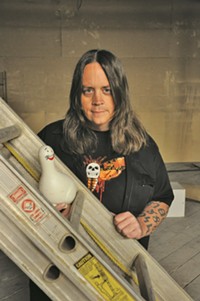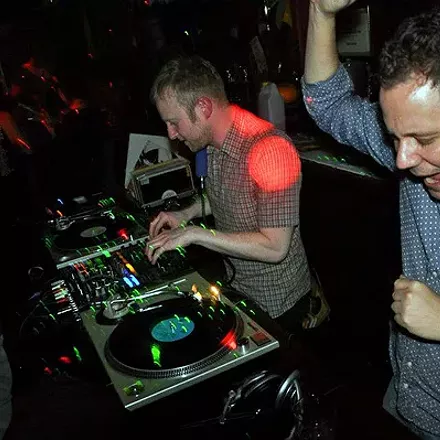The Local Music Issue 2017
Our annual offering to the local music gods.
By Randy Harward, Brian Staker @stakerized and Zac SmithPage 4 of 7
Salt Lake City's music scene is populated with more talent than ever. We have the ubiquitous glut of underground strugglers, but also more bands signing deals with bigger indie labels and, failing that, steering their own careers as they navigate interstates in gear-burdened vans. That doesn't always mean they've made it. You'd be surprised to learn how many of your favorite non-local bands, after signing autographs in Salt Lake City, return home to part-time jobs or even school. Because everyone in the world wants to do what they love, not what they must, and sometimes that means doing a little of both.
Booked: Eagle Twin's Gentry Densley
Gentry Densley is known nationally for the bands Eagle Twin and Iceburn, but he still keeps a day job as a librarian at the Salt Lake County Jail. How does he balance work, two bands, a guitar amplifier company and a new baby? "There's a bit of pressure," he tells City Weekly before a Saturday-morning shift. "But I leave it at the gates when I go home."
Densley says working with the inmates is rewarding. "I think if they didn't have books and other programs, they might turn inward or turn against each other more. It gives them a kind of escape." His supervisor is mindful of Densley's need for time off to record (new releases are imminent for both bands) and tour—Eagle Twin will cover the U.S., Europe and Australia this year. So far, he's achieved a good balance, finding inspiration in his work.
English poet Ted Hughes' book The Crow influenced his band's first two albums, The Unkindness of Crows and The Feather Tipped the Serpent's Scale (Southern Lord, 2009 and 2012). Hughes' style even informs Eagle Twin's two upcoming albums. "I identify with the language so much. It's really animistic, but talks about human problems," the staple of the local metal, punk and experimental scenes says. (BS)
Pagará: Marco Antonio Garcia
Marco Antonio Garcia could be reading any of the comics on the Watchtower Café shelves. Instead, he studies a textbook. The printer, graphic design student and musician has a 5 p.m. class across the street at Salt Lake Community College.
Now 35, Garcia had just started playing music when he left Guadalajara at 18 to join his father in SLC. "I loved it," he says. "But when I got here, it was kinda hard because it wasn't that much of a scene." Alone in his room, he played songs by Latin bands like Soda Stereo and Cuca on his father's guitar. In 2002, an ad in the Spanish-language publication El Semanal led him to join Elemento, gigging at places like Club Mambo in South Salt Lake. When Garcia met Gabino Ramirez and his brother Juan Rodriguez, they, with guitarist Angel Martinez, formed the rock en Español group, Leyenda Oculta.
Garcia continues to play bass with Leyenda and sing in La Calavera, and both bands open SLC shows by some of Mexico's biggest acts, like Cuca, Molotov and El Tri. And the local rock en Español scene is alive with bands like Cenizas Ajenas, De Despedida and Musor, and bimonthly shows at Liquid Joe's. It remains somewhat of a "hidden legend" (to translate Leyenda's name), but Garcia knows hard work pays off. (RH)
Dine Alone: Erasole James
Rapper-artist-designer Erasole James is everywhere and nowhere. He dropped his phone in the Pacific Ocean a couple of weeks ago. He finally sends a Facebook message from a random woman's account, and we connect at The Urban Lounge. Rocking black retro Jordans, items from his own clothing line and a "brand-new" flip-phone, James says how, despite quitting (perhaps losing) his day job, he's one of the hardest-working and well-traveled artists in Salt Lake City.
Currently, James is dropping jams and music videos like the proverbial golden goose while fellow members of Dine Krew, like Piccolo and Shelby, work on solo material of their own. "2016 was a really explosive year," James says from behind circular shades. He dropped two albums on Dine Records. Into the Muh was written on the island of Kauai and Memories de Miramar was penned while on an eco-tourism trip to Havana. Through his deal with the Damn Son label came Before Common Era, which was created in Las Vegas and California. Travel, he says, is partly to escape the inversion. "The air—I need to get out of the garbage," he says. "It's dirty." It's also inspirational. "Whenever I'm in the Islands or the Netherlands or L.A., albums just come pooping out of my head. As soon as I touch down—bars." (KLM)
Makin' Grains: Secily Saunders
Secily Saunders doesn't remember a time when she wasn't playing music. She spent her formative years in Cleveland and then Orem, performing in the Mo-pop universe that suited her LDS upbringing. "I'm on church soundtracks," she says. "My first real gig was at Kingsbury Hall with Alex Boyé."
Although she's left the church, Saunders never left music—it's all she does. She was the founding music director for Rock 'n' Roll Camp for Girls SLC, and also worked with the Portland and L.A. camps, and plans to become involved with more camps in the future. She also helps produce the SLUG Magazine Soundwaves podcast. There's never been a better time to get to know Utah's diverse music scene, she says.
Her folk group Canyons, which she formed with her girlfriend Kate Anderson, helped fill an important space for both the LGBTQ and alternative music communities in SLC. Now, after Canyons' recent breakup, Saunders and Anderson have a new band called Winter Grain. The band will soon travel to Seattle to record their first album at Brandi Carlile's Bear Creek Studio with producer Ryan Hadlock (of The Lumineers, Foo Fighters and Carlile). Working with someone who has produced their idols feels surreal. "We're really freaking lucky. It feels like a whirlwind, and I don't want to look at it or it'll go away." (KB)
SubRosa: Rebecca Vernon
SubRosa's Rebecca Vernon has a lot in common with comic book superheroes. By day, she's a mild-mannered proposal manager for Orion Health, where she compiles and assembles information into lengthy business documents. By night, she breathes shadowy un-life into the eldritch compositions that make up SubRosa's dark repertoire. "I always resisted getting a corporate job because I thought it would take away my freedom," Vernon says. "But if it wasn't for my job, we wouldn't be able to do half of the things we get to do." She means touring, mainly—SubRosa goes as far as Russia, where they're bona fide rock stars.
While it's true that Vernon's career happens to have enough flexibility to balance her passion for making music, the fact remains that it's possible to juggle both a career and a doom-metal band. Most musicians will inevitably seek out day jobs, and Vernon is an example of why that's not necessarily a bad thing. "I see a job as a way to find fulfillment in life, but also as a means to support my art. You have to do it for love of the music," she says. "You have to love it or it won't sustain you through the hard times." (AS)
More by Randy Harward
-
Live Music Picks: April 19-25
MC Chris, Talia Keys & the Love, Nick Passey, Brian Wilson and more.
- Apr 18, 2018
-
Rock-It Fuel
Local musicians dish on the grub that puts the bomp in their bomp-bah-bomp-bah-bomp.
- Apr 11, 2018
-
Live Music Picks: April 12-18
Judas Priest, The Residents, Clownvis Presley, The Breeders and more.
- Apr 11, 2018
- More »
More by Brian Staker
-
Live Music Picks: April 12-18
Judas Priest, The Residents, Clownvis Presley, The Breeders and more.
- Apr 11, 2018
-
Loving the Alienation
Helios Creed and Chrome continue making iconoclastic music for outcasts.
- Mar 28, 2018
-
Live Music Picks: March 22-28
U.S. Girls, Ed Schrader’s Music Beat, Hell’s Belles, Columbia Jones and more.
- Mar 21, 2018
- More »
More by Zac Smith
-
True Grit
Kickin' back with Ogden's funky hip-hop band, Grits Green.
- Aug 17, 2016
-
Live: Music Picks Aug 11-17
Women's Redrock Music Festival, God's Revolver, Zakk Wylde and More
- Aug 10, 2016
-
Something for Everyone
DJ Sneeky Long mixes hip eclectica with cheap mainstream-ery.
- Aug 3, 2016
- More »














